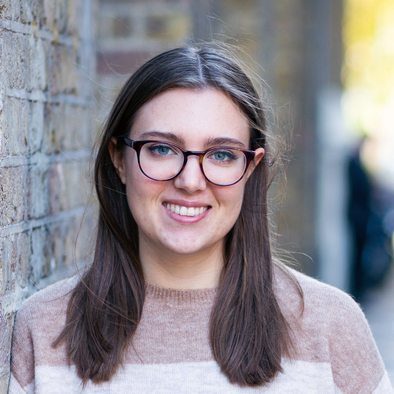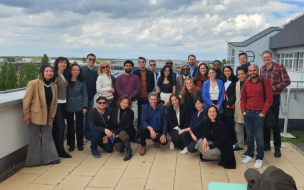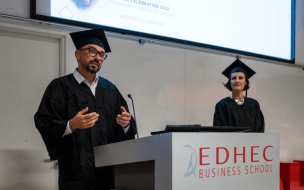A business master's is a specialized degree that will help you launch your career in a particular area such as finance, data analytics or management. An MBA, meanwhile, is a more advanced program that takes a broader view of business and management, which can help experienced professionals switch jobs or leap into more senior roles.
But some schools offer the two degrees in one. On a double (or dual) degree, such as the MSc/MBA Double Degree at EDHEC Business School, you’ll study a business master’s and an MBA over two years, allowing you to specialize early and supplement your learning with business fundamentals.
Why a dual degree?
Nanni Cotronei graduated with his bachelor’s degree in economics and finance in 2018 and didn’t immediately transition into a master’s program. Instead, he gained a few years of professional experience, first in corporate governance for a company in Ireland and then accounting for an NGO in Rome, his home city.
But after a few years of working, Nanni realized he wanted a career transition.
“I wanted to make a switch from accounting to more financial services in the banking and investment sectors,” he explains.
Initially, his search for graduate degrees led him to a Master’s in Finance, but then he found out that his school of choice, EDHEC, offered a dual degree: a Master’s in Finance with an MBA.
“I realized that a Master's alone would probably lead me to a more technical or analytical position. So, I saw the MBA as an opportunity to have an edge when it came to promotion to a more managerial position,” says Nanni.
EDHEC’s dual MSc/MBA degree also comes with lower entry requirements than standard MBAs—just two years of work experience compared to a minimum of three years.
The cost of the program was also attractive to Nanni. With tuition at some of the world’s top MBA programs frequently reaching US$100,000 or more, EDHEC’s US$66,000 price tag for two graduate business degrees is competitive.
The EDHEC experience of a dual degree
On the dual degree at EDHEC, students can choose between two master’s programs: MSc Business Management or the MSc Finance. Each program is then combined with EDHEC’s Global MBA to make an intensive, two-year double degree program.
As a result, students spend the first year diving into their specialized course and the second year studying broader modules in business strategy, leadership, finance, and analytics. For Nanni, this combination was ideal.
“The thing I enjoyed about the Master’s in Finance is that it allowed me to go much deeper into finance subjects,” Nanni points out. “At the same time, I've never studied marketing or organizational processes or psychology, so it was very interesting to get those aspects as well.”
Students also get to tailor their MBA experience with a choice of electives, a specialization track and a tailored MBA project, allowing them to gain a deeper understanding of a particular area or explore something new which is aligned with their personal goals and ambitions.
“My advice would be to choose carefully the first year, and then the second year, try to be as open as possible,” Nanni argues. “It's very easy to go in fixed on what you want to get out of it, but keep an open mind.”
Launching your career after a dual degree
The EDHEC curriculum also includes a Sustainable Impact Challenge, where students work in teams to solve real-life challenges at companies.
For Nanni’s project, he worked with Astarte Capital Partners, an asset management firm in London. When his team completed the project, Nanni was offered a remote summer internship at the same company, which rounded off his MBA experience. After graduation, Nanni landed a full-time role as an associate at PwC Luxembourg.
“I'm in a company that stimulates you to become more of a manager,” Nanni explains. “So I’m getting involved in projects about technology and innovation and leveraging my experience not only on the technical side but also in relationship building.”
Nanni says that the dual degree program helped him define his career goals and gave him a more comprehensive view of business.
“It gives you a much broader view of what it means to build a career, and potentially a company, in the world and how companies work. I appreciate it a lot," he says.
"It's definitely worth it because you can get back into the job market with a much more secure view of who you are and what you want from your career."








